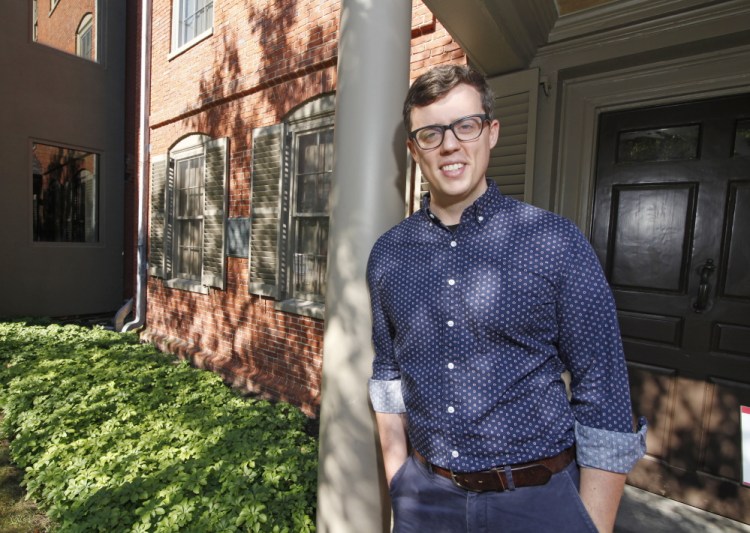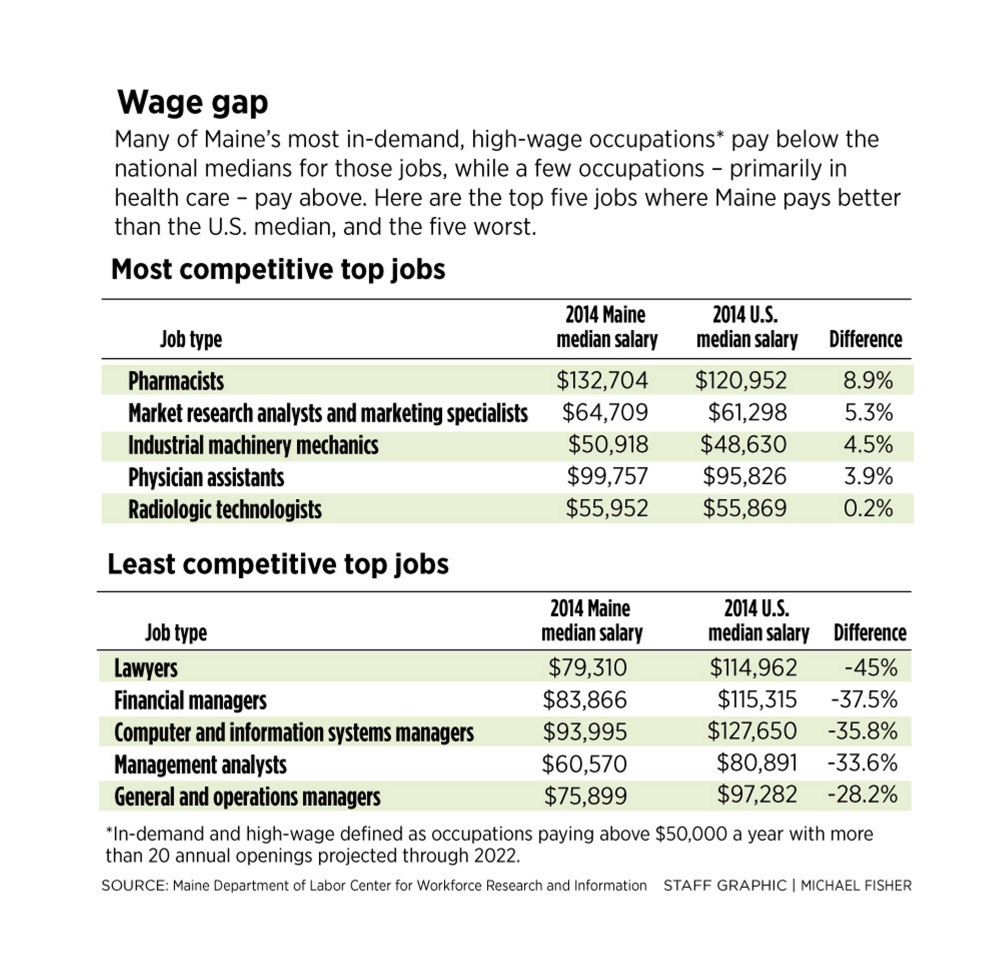Maine has a growing shortage of highly skilled workers, yet employers in the state continue to pay considerably less than their counterparts nationwide for many of the most sought-after professionals.
Labor officials are predicting a worker shortfall of more than 100,000 by 2032 as aging baby boomers in the workforce retire, with far fewer young people coming up to take their places. Still, a Maine Sunday Telegram analysis of 28 professions identified by the Maine Department of Labor as “high-demand” jobs with a median salary of at least $50,000 found that such jobs pay an average of 14 percent less in Maine than they do across the nation. The wage shortfall for some professions was much larger than that.
Some workforce-development experts believe Maine’s relatively low median wages for professionals such as lawyers, accountants, computer experts and various management-level jobs help explain why some employers in the state have trouble attracting qualified candidates. That problem is likely to worsen, they said.
However, a number of professionals who have relocated to Maine said they were happy to trade some potential income for a more enjoyable lifestyle.
Twenty-two of the 28 professions examined had lower median wages in Maine than they did nationally. Lawyers fared the worst, with a median wage nearly 45 percent lower than the national median, based on U.S. Bureau of Labor Statistics data for 2014. Median wages for financial managers, computer and information systems managers and management analysts in Maine were at least 30 percent lower.
The wage gap isn’t new, but it is getting increasingly difficult to explain because a boost in demand for jobs is supposed to drive up wages, said John Dorrer, former senior vice president of Training & Development Corp., a Maine-based nonprofit focused on workforce and regional development.
Because high-skill occupations are typically less concentrated in Maine, making career advancement more challenging, it would be logical to assume that employers would have to at least match the national median wages to attract quality candidates, he said.
“In many respects, for Maine employers to compete for high-end talent, their wage offers need to be on the higher end to effectively compensate for the other market limitations,” said Dorrer, a program director for workforce-development group Jobs for the Future in Boston. “But, for too long, we have rationalized lower pay assuming that Maine’s amenities and lifestyle will compensate. I am skeptical of that rationale.”

Hope Burnell, director of human resources at InterMed, says health care workers have an advantage because they are in such high demand.
New Jersey native Dan D’Ippolito said it took some coaxing by his wife, who grew up in Freeport, for him to embrace the idea of moving from Brooklyn, New York, to Portland in 2013. D’Ippolito, communications manager at the Maine Historical Society, said he was aware jobs tend to pay less in Maine. However, he loves the state’s lifestyle and natural beauty.
“I realized that we wouldn’t be making as much money,” he said, adding that Maine is also more affordable than New York. “Things are a little tight, but it’s totally worth it.”
While individual workers shied away from disclosing their actual incomes, Bureau of Labor statistics show that demand in Maine does seem to be producing nationally competitive wages in at least one industry: health care. Of the six professions examined with median wages in Maine equal to or higher than the national median, four were in the health care field. They included physicians and surgeons, radiologic technologists, physician assistants, and pharmacists, who earned a median salary in 2014 that was nearly 9 percent above the national median.
Hope Burnell, director of human resources at InterMed, said job candidates in medical professions have the advantage because they are in such high demand.
“The demand for health care services drives the wages,” she said. “There’s a lot of competition for the talent.”
Because the required education is so expensive, there is a relatively solid floor to the wage levels most doctors, nurses and other highly skilled medical professionals will accept, Burnell said. And with a growing number of Maine’s health care professionals coming from out of state, she said, health care employers are under even greater pressure to offer competitive salaries. Burnell said about one out of every 10 recent new hires at InterMed has been recruited from outside of Maine.
“We’re hiring more folks from out of state in the past two years than we have in the past,” she said.
OTHER FACTORS IN PLAY
For some professions, a direct comparison between median wages in Maine and elsewhere may be unfair, said Edward McKersie, founder and president of staffing and recruiting firm Pro Search Inc. in Portland.
For example, it’s likely that sky-high lawyer salaries offered at huge lobbying firms and corporations in major cities are driving up the national median wage for the profession, McKersie said. If those jobs were excluded from the data, the median wage for attorneys in Maine likely would be more competitive.
And while the cost of living in Maine is not particularly low, there are other advantages to living in the state that tend to attract highly skilled workers, McKersie said. He pitches Maine to candidates as a place where they can shorten their commute, buy more house for the money, find great schools for their children, meet nice people and generally enjoy a better quality of life.
“The people we’re trying to attract are the ones who are tired of earning combat pay,” he said.
Portland attorney Cory McKenna, who is originally from Boston, agreed that living in Maine is worth sacrificing a potentially higher salary.
“For some people, it’s not all about money. I wish it was most people,” said McKenna, a defense lawyer with Fairfield & Associates. “If you’re happy, who cares how much you’re making?”
Send questions/comments to the editors.





Success. Please wait for the page to reload. If the page does not reload within 5 seconds, please refresh the page.
Enter your email and password to access comments.
Hi, to comment on stories you must . This profile is in addition to your subscription and website login.
Already have a commenting profile? .
Invalid username/password.
Please check your email to confirm and complete your registration.
Only subscribers are eligible to post comments. Please subscribe or login first for digital access. Here’s why.
Use the form below to reset your password. When you've submitted your account email, we will send an email with a reset code.